16th January 1942 (Fri)
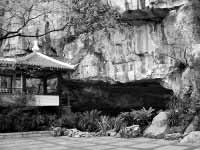
The White Ensign carried by the party from Hong Kong and displayed in the iconic Waichow photo was signed by all the members of the escape party and presented to the Mission in recognition of their hospitality. The following morning the party left by train for Luchow the capital of Anhui province at 09.00 on the Canton-Hankow railway. [21]
Ships Log "03.00 Reveille. Wash & pack. 04.00 Breakfast. 04.45 Gear loaded into lorry. 05.00 Marched to railway station. 05.40 Arrived at railway station, to find that train not leaving till between 8-9.
Left eventually about 9am----troops in 3rd class car, officers in 2nd class. Slow train, with frequent stops. [5]
Lt Kennedy RNVR "The train came in at last, and we were soon rewarded by superb scenery as we rumbled along the bank of the Fei River." [9]
Ships Log "13.00 stopped for a few minutes at Pingshek. Arrived at Hengyang shortly after 6.00 & after considerable shunting our two cars were attached to another train, & we arrived at about 7.00 at Hengyang’s main station, being greeted with banners & a delegation of officials of the Hunan-Kwangsi Railway Administration. Excellent dinner with wine while rest of train kept waiting. On again about 9 pm." [5]
PO Buddy Hide "We caught a train at 3.0 in the morning; had five days train journey subjected to bombing." [21]
Lt Kennedy RNVR "The Canton-Hankow railway line was bombed repeatedly but never put out of action for long. The Chinese were prepared with stocks of sleepers and other materials at strategic points along the way." [9]
Sub-Lt Legge HKRNVR "They then got us a private train in which we continued our journey, through Hengyang in Hunan, Kweilin and Liuchow to Chin Shien Chiang. This took us another five days, one or two being wasted being shunted about on sidings with no apparent reason and with the most appalling bumping and crashing. The journey was at any rate very interesting and the country pretty." [18]
The party stopped at Ping Shek, a village on the Kwangtung border. Here they saw what can only be described as a "Rock Forest" which was just amazing, natural beauty. Then it was across the plains of Hunan Province covered in rice fields. At Hengyang their carriages were split from the rest, and the Hunan-Kwangsi Railway Administration Authority laid on a special supper for them in the waiting room decorated with allied flags painted on cardboard. Then it was onto Kweilin [Guilin], now each carriage had a steward, and by morning they were in Kwangsi Province still rolling across the plains. As they approached the city of Kweilin [Guilin] they rolled through more rock forests. [21]
17th January 1942 (Sat)
Ships Log "Arrived at Kweilin at about 1 pm. At 3.30 all officers & some ratings taken in lorry to inspect “Seven Star Cave” largest of many caves in hills round city, & an ideal ARP shelter for 50,000 people. Left Kweilin around 7 o/c." [5]
Another air-raid warning was in progress.
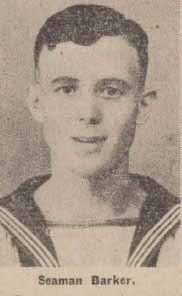 L/S Les Barker "Still travelling, stopped at 1pm for air raid alarm and scattered in the cliffs which afforded natural cover against air attacks. After about half an hour we proceeded again. Stopped at 11pm at Kwii-Lin east and party went to visit some caves. One in particular was a huge cave called ‘The seven Star Cave’ which was only discovered 5 years ago and said to house 300,000 and was being used as an air raid shelter. Carried on again at 8, travelled through the night." [24]
L/S Les Barker "Still travelling, stopped at 1pm for air raid alarm and scattered in the cliffs which afforded natural cover against air attacks. After about half an hour we proceeded again. Stopped at 11pm at Kwii-Lin east and party went to visit some caves. One in particular was a huge cave called ‘The seven Star Cave’ which was only discovered 5 years ago and said to house 300,000 and was being used as an air raid shelter. Carried on again at 8, travelled through the night." [24]
Left Photo from The Nottingham Evening Post ©
18th January 1942 (Sun)
Ships Log "Arrived at Liuchow in the afternoon. It was originally intended to put us up at a local hotel, but accommodation found inferior to train. Hotel provided excellent hot baths however, & full advantage was taken of these." [5]
19th January 1942 (Mon)
Ships Log "Quiet day of false starts, waiting for troop train to arrive which didn’t. Party rejoined by Ashby & Brewer. Shunted around all night." [5]
onmouseout="MM_swapImgRestore()" onmouseover="MM_swapImage('Image19','','images/HK/Burma_Roadster-Kennedy.jpg',1)">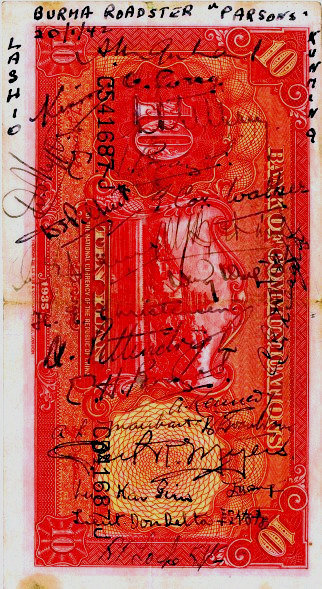 Lt Kennedy RNVR "We left Liuchow more than once, only to find that we were being shunted into another siding. On our fifth day in the train we finally got away from Liuchow on the last stage before the rail-way line ended." [9]
Lt Kennedy RNVR "We left Liuchow more than once, only to find that we were being shunted into another siding. On our fifth day in the train we finally got away from Liuchow on the last stage before the rail-way line ended." [9]
20th January 1942 (Tue)
Left Escape party officers signed Yuan banknotes as souvenirs while waiting on the train. Click on the image to see whose signatures have been identified.
Ships Log "Dep at 11.07. Arrive Kumsingkons about 7 pm. & remained on board." [5]
A7 7pm Admiral Chan Chak made a radio broadcast on 'The Youth and the Hong Kong Fighting' in which he praised the British troops defending Hong Kong. Chan went on to recount his dramatic escape with the 2nd MTB Flotilla and again praised the Royal Navy party who protected him while behind enemy lines.
21st January 1942 (Wed)
Oliver Lindsay Author "Unfortunately, Lieutenant Ashby fell seriously ill with typhoid and a temperature of 1040. Gandy tried to encourage him while they waited for an ambulance." [80]
Lt- Cdr Gandy RN (Ret) "I told Ashby that I would surly recommend him for the Distinguished Service Cross for his daylight MTB attack on the Japanese in Hong Kong. I added that, as he well knew, I was a procrastinator about reports, unless reminded; I expected him to do the reminding in this case, and that was an order. I believe my remarks did a lot of good. He survived and received the medal in due course." [80]
On arrival at the railhead at the walled hill city of Ichang the party embarked upon four trucks Gandy had hired at a cost of ROC$80,000 borrowed from the Adjutant-General, IVth Chinese Army while in Liuchow. It was a two day journey through the mountains to Guaiyang. Fine rain makes the dusty road treacherous, sometimes with no barriers even on the many S bends. There was much traffic and lines of Shetland like ponies with bells.
Lt Kennedy RNVR "After a night spent in the railhead sidings, we prepared in our optimistic way for a start at the crack of dawn. The four Chinese army trucks arranged for us from Kukong were ready for the road, and by six o/clock our gear had been crammed into the back beside petrol drums and spare tyes. We climbed hopefully on top of the pile and waited for something to happen, but we should have known better" [9]
Ships Log "Up at 5 am. on board trucks at 6 am, start delayed till 9 am as papers were not ready. Further delays owing to breakdowns en route & sick man (Lt Ashby) in last truck. Tiffin at noon. On again at 2 pm. considerably behind schedule. Spent night in 5th rate hotel." [5]
Lt Kennedy RNVR "Truck drivers were paid according to the amount of fuel they saved as it had to be hauled up the Buma Road We were hardly out of sight of the railhead when all four trucks stopped and the carburettor jets changed. " [9]
Admiral Chan Chak ROC was finally well enough to leave the Mission at Ho Sai and proceed to Guilin by train via Hengyang. [6]
22nd January 1942 (Thur)
Ships Log "On again at 7 am. Arrived Tuckshan about 11.40. On again 1.30, arrived at Machongping at 6 pm. Better accommodation. Last truck remained at Tuckshan with sick man (Ashby)." [5]
L/S Les Barker "Off again at dawn and had dinner at hostel belonging to the China Travel Services. We Stopped at Duok, again at a boarding house for chow and sleep, 4 in my bed and 3 on the deck." [24]
23rd January 1942 (Fri)
L/S Les Barker "Dawn start, on the way to Kwei-Ang. The road is very treacherous, covered with a layer of mud and all the time we are climbing. Raining very fine rain so it doesn’t give the road a chance to dry up. Plenty of traffic on the roads, and we also see Shetland ponies with bells on their heads. Sometimes these ponies were 40 or 50 in a line, led by one or two men.
We were skidding a lot this morning on this murderous road. 1015 – And our lorry failed to negotiate an ‘S’ bend and, before we knew what was happening, we toppled over, taking a complete turn and a half. Luckily we only had four injured, but if we had gone over once more there was a drop of 100 feet and we should have all been killed.
After, the lorry was hauled back to the right way up and, after treating the wounded and getting them away in another lorry, we piled back into the same lorry and proceeded again to Kweiyang, very much shaken by our experience and leaving the road littered with eggs and oranges.
Driving more carefully after that, we finally arrived at Kweiyang and were met by a party of Chinese Red Cross who had everything prepared, clothing, cigarettes, hot baths, etc. Very much appreciated by all hands." [24]
One of the trucks in the convoy overturned in the mire on a bend injuring several ratings in the back, the most serious being A/B Charlie Deakin with a broken shoulder. [3]
Ships Log "On at 8 am. Truck with Lt Collingwood overturned some 90km from Kweiyang. Three or four casualties—not serious, one with fractured collarbone.
Last truck left Tuckshan at 6.45 am.
Arrived Maclongping At noon; sick man put in ambulance.
Left at 2pm, arrived Kweiyang 7 pm." [5]
L/S Les Barker "The road was treacherous and inches deep in mud. Just before the end of the journey, the lorry in which I and 13 companions were travelling failed to negotiate an “S” bend and turned a double somersault." [24]
Lt Collingwood RN "One truck skidded and turned and five men were hurt but it was put back on the road and we continued." [8]
Sub-Lt Legge HKRNVR "My truck, which was second in the convoy had about fifteen men inside with me in the back between two fifty gallon gasoline drums looking out backwards. My Captain (Collingwood) was in front with the driver.
Going round a steep corner, we started to skid. On the off side was a drop of several hundred feet. Luckily we hit a large stone at the outside of the road, turned around across the road and turned over.
I didnít realise what was happening until I found myself sitting in the mud in the road with the truck on top of me. The truck had only iron hoops and a canvas cover and we would all have been squashed had it not been for the fact that one of the gasoline drums fell on end with the end of the truck sitting on top of it.
We were in a pretty pickle, 80 kilometres from the nearest telephone, sitting in the rain and mud and no way of getting immediate help. Then as I was attending to one of the men who had a deep cut above the eye, he pointed out that blood was pouring down my face.
There were two other men fairly badly hurt, but except for extensive abrasions we couldn’t find out what was the matter. Then luckily the next truck came along. We transferred the wounded into that and with myself in the front set off 80 km. to Kweiyang where there was the nearest hospital. It was a terrible ride as not only was the road very bad with all the rain that was coming down, but the wounded men were in rather bad shape.
We had morphine with us but didn’t like to give it in case they had to have an immediate operation on arrival and couldn’t be given any more anaesthetics." [18]
L/S Les Barker "Luckily only four were injured – but if the vehicle turned over once more it would have fallen 100 feet and the whole party would certainly have been killed. The Chinese driver wept. From then on he drove more carefully." [24]
A/B Lenny Rann "The road was full of hairpin bends and the truck in which I was riding capsized and several of the occupants were injured." [63]
After clearing the Tol Post at the Guiyang city gates the party obtained directions to the Head Quarters of the Red Cross Society of the Republic of China in Tuyunguan high up in the mountains above the city. The society could be traced back to its foundation as The Shanghai International Red Cross Committee formed on March 10, 1904. The Society migrated to Formosa, now Taiwan in 1949 and is still maintained there today.
The first two trucks arrived at 14.00 and were met by Dr Robert Lim.
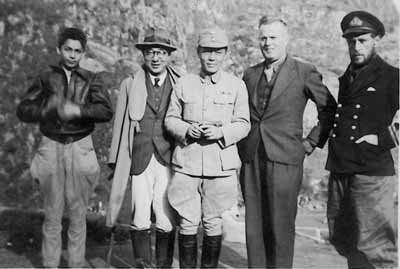 Lt Kennedy RNVR "The officer who greeted us so warmly in fluent English was Doctor Robert Lim, a smartly-uniformed Chinese officer. As he drew closer the ribbons on his tunic caught my eye at once, for they were the three British campaign medals of the 1914-18 war." [9]
Lt Kennedy RNVR "The officer who greeted us so warmly in fluent English was Doctor Robert Lim, a smartly-uniformed Chinese officer. As he drew closer the ribbons on his tunic caught my eye at once, for they were the three British campaign medals of the 1914-18 war." [9]
Left:: Dr Robert Lim seen here with Lt Cuthbert J Collingwood RN, was a Lieutenant-General in the Army and Surgeon-General of the Republic of China. He was a long standing friend and former golfing partner of Admiral Chan Chak.
The forty four year old Lt-General known by all as Bobby, had drawn up a schedule of events ranging from official functions, cinema shows, boating to football for their three day stay.
Lt Kennedy RNVR "Accommodation for the whole party had been prepared in the hospital camp lying in the fold of the hills called Tuyunguan, where Dr Lim took us himself and showed us round the huts
Doctor Lim seemed genuinely pleased to see us, by the way he filled every minute of our two days' stay made the visit a memorable one." [9]
The Royal Navy party found it very reassuring knowing that Admiral Chan Chak was still looking after their welfare from his sick-bed nearly a thousand miles back down the road in Kukong recovering from a burst stomach ulcer and blood transfusion. [43]
Lt Kennedy RNVR "The meaning of Tuyunguan we were told was 'Cloud-earth-pass,' and it was certainly true of the place while we were there, for the skies were grey and cheerless and cold mists swept down the mountain side. At the hospital nurses were trained for future service at the front, and soldiers were given courses in sanitation, a subject so manifestly omitted from the education of the average Chinese. Plastic surgery and other modern treatment were applied to the wounded and disfigured men lying in a special ward, and artificial limbs were made in the Red Cross workshops with the same skill and craftsmanship displayed by the Chinese in more familiar fields. All this work had to be done with the meagre trickle of drugs and equipment entering the country by the one surface route still open to China's allies. Improvisation was the order of the day." [9]
As well as two European Physicians known as the Spanish Doctors, there was also a US Army surgeon with the American Military Mission to China (AMMISCA).
1st-Lt John Grindlay had been in China since September overseeing the US Lend-Lease supplies for use by the embattled Chinese government of Generalissimo Chiang Kai-shek in its fight against the Japanese. [36]
Dr Grindlay 1st Lt US Army "About 2 p.m. great excitement - the 40 refugee sailors & Officers who escaped Xmas day from Hong Kong arrived - 32 in the first bunch. Rain & mud on road & one truck had skidded off & turned on side - resulting in several injuries -- lacerations. Nearly all bearded." [36]
Bobby Lim was arguably the greatest Singaporean of all time and became "One of the great men of China." [99]
General J W (Vinegar Joe) Stilwell of the US Army presented him with the "Legion of Merit." one of the USA's highest honours.
In 1939 a team of European doctors had been recruited in London by the China Aid Committee. Among them were an Austrian, Dr Fritz Jensen and a German, Dr Rolf Becker. Both had escaped from southern France after being incarsarated following the Republican fefeat in the Spanish civil war.
The following summer they were in Hong Kong collecting medical supplies to transport to the Chinese Red Cross HQ near Guiyang.
While in Hong Kong Rolf Beckecker met twenty six year old Joan Staniforth, employed as a nanny by Percy Selwyn Selwyn-Clarke, Director of Medical Services in Hong Kong. Joan was keen to see more of China and resigned position, joining the doctors on their expedition.
Led by a Mr Ray, an old China hand, wearing a heavy canvas suit and pith helmet the party sailed to Macao. Both doctors were travelling on Spanish pasports.
Graham Peck "The leader of the party was an elderly Texan missionary from Kwangsi Province, who spoke rapid Cantonese with a high Panhandle accent and had made the trip several times before, running church litriture and canned goods through the blockade. This trip he was escorting half a dozen Chinese Christian virgins whose families had decided they would be safer in the interior even though they weren't pretty. Also with him were an English girl, an Austrian doctor, a German doctor; all in the Red Cross.
On a hot misty morning in early July we sailed for Macao on an excursion steamer packed with refugees, passing in mid-journey a sister ship, Hong Kong bound and crowded who had decided Macao was to be attacked. " [104]
In Macau they negotiated with a gang of people smugglers for a fee of HK$35.00 per person, a little over two English pounds to cover all expenses including ransom fees en route through the pirate infested inland water ways. They became aware that the army, police, pirates, and smugglers seemed to be in cahoots with each other. At Tam Shui Ko the party split up with the medical party embarking on trucks to complete their journey to Tuyunguan. Joan took on the role of secretary to Dr Lim and tutored his daughter Effi who was a reuctant student.
Dr Rolf Becker and Miss Joan Staniforth were married in a service at Tuyunguan conducted by Dr Robert Lim. [99]
Lt Kennedy RNVR "The meaning of Tuyunguan we were told was 'Cloud-earth-pass,' and it was certainly true of the place while we were there, for the skies were grey and cheerless and cold mists swept down the mountain side." [9]
Lt Ron Ashby arrived later by ambulance. The medics attended to the party's injuries to the best of their abilities while Lt-Cmd Gandy procured funds which enabled the party to do some essential shopping. They were billeted within the hospital complex.
Dr Grindlay 1st Lt US Army "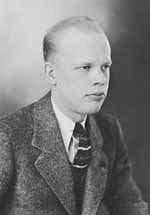 The overturned truck came on a little later than first 2 & it was evening before Gandy & several officers & a sick man [Ashby] with] suspected typhoid came on. Altogether 16 officers, rest "ratings" Brewer, Legge, Collingwood, Kennedy, Gee, & Parsons were younger officers.
The overturned truck came on a little later than first 2 & it was evening before Gandy & several officers & a sick man [Ashby] with] suspected typhoid came on. Altogether 16 officers, rest "ratings" Brewer, Legge, Collingwood, Kennedy, Gee, & Parsons were younger officers.
First men all slipped & skidded through mud to new barracks. These cleaned up & fires in gas drum stoves going." [36]
PO Buddy Hide "On the way a lorry overturned and three men suffered with broken bones. Tuyunguan is the medical centre for the Chinese Army. There they attended to our injuries to the best of their abilities and supplied us with Red Cross trucks to take us to Lashio, in Burma." [21]
Sub-Lt Legge HKRNVR "The Chinese Red Cross has a wonderful hospital at Kweiyang, all mat sheds but very well run. They were prepared for us as we had arranged in advance to stay with them for a day or two. We found that two chaps had broken shoulder blades among other minor things. I had to have seven stitches put in the top of my head, which was not so pleasant as it was about five hours after the accident." [18]
L/S Les Barker "At Tuyunguan, the Chinese Red Cross had everything prepared – food, beds, hot baths, clothing and cigarettes." [24]
Lt Kennedy RNVR "Accommodation for the whole party had been prepared in the hospital camp lying in a fold of the hills called Tuyunkwan, where Dr Lim took us himself and showed us around the huts. The meaning of Tuyunkwan we were told was cloud-earth-pass." [9]
Eddie Brazel HKRNVR "Here we stayed at the headquarters of the Chinese International Red Cross, who had a wonderful place. During our stay of three days in Tuyunguan we had a marvellous time, being entertained by Governor Wu among others, in addition we played the training school at football." [46]
Lt Kennedy RNVR "Doctor Lim was eager to hear more news of Admiral Chan Chak who was an old friend and former golfing partner of his, and we told him what we could as we sat comfortably in his house sipping orange gin on the evening of our arrival." [9]
Dr Grindlay 1st Lt US Army " I am sure the arrangements pleased the men, also sure they didn't know at what effort that had been arranged, & the cost of things procured -- as the entire Chungking gin supply of Bobby's (Dr Lim) they drank -- Dr T F Chang -- "They drank 16 catties (1 1/3 pints) of mine."
Gandy, a retired Lt-Cmd on active duty, very thoughtless and demanding type & not liked by the men." [36]
Four months later in May both Dr Grindlay and Dr Lim endured the hardships of Lt-Gen Joe Stilwell famous"walkout" of Burma to India. Grindlay kept a day to day record of their endurance. [36]
A/B Lenny Rann "We arrived at the Chinese International Red Cross premises at Guiyang, where we were again well looked after and were given the freedom of the city by the governor." [63]
Sub-Lt Legge HKRNVR "We all bunked in a large dormitory, which had big stoves in the center, heaven to us after the places we had been sleeping. Also we had our first decent liquor. They were very good to us and we were looked after like kings." [18]
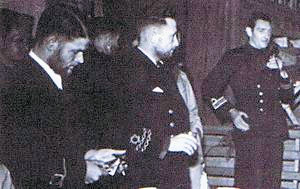
Lt-Cmd Gandy RN accompanied by Lieut Pintendrigh RNR, and Sub-Lieut Brewer HKRNVR giving a speech in Guiyang.
24th January 1942 (Sat)
Ships Log "Visit to Governor in the morning. Conducted tour of centre in the afternoon, followed by a tea, & movies after dinner." [5]
L/S Les Barker "After tea ten of us were entertained by the international Red Cross, who were five or six British men and one American." [24]
The party were given the freedom of the City after a speech by General Wu at the City hall and each was given a card showing the primitive life of the Chinese tribes, sealed with the Governor's private seal and signature.
Lieut-Commander Gandy R. N. (Ret) "Each member was given a memento of the visit." [15]
At 4 p.m. they had a cinema show put on by the Red Cross followed by a few sketches put on by the navy party which brought hoots of laughter. Dr Lim offered the use of his Red Cross trucks to transport the party to Kunming, the Chinese end of the Burma Road as they were driving there empty to pick up medical supplies.
Lt Collingwood RN "Luckily my sub-lieutenant [Legge] spoke Chinese so we were normally in the van for the feeding and sleeping arrangements." [8]
Sub-Lt Legge HKRNVR "There were one or two pretty ex-Shanghai girls there, with whom I spent most of my time the next few days, rather, I think, to the jealousy of other less fortunate officers." [18]
Major Goring, still in Kukong, had now recovered from his malaria attack. Lt-Col Harry Owen-Hughes and Dr Moore took him to the station where he proceeded by train to Kweilin and from there by air to Chungking.
Maj Goring BHQ "After tea I said goodbye to the gallant little Admiral, whom I was very sorry to leave. I had liked him well in Hong Kong, and grown to love him during our journey, for he had shown himself not only a man of infinite pluck and resource, but also extremely thoughtful for others." [17]
25th January 1942 (Sun)
Visit to Local Park at Huaxi followed by soccer match in the afternoon, losing 6-1 against the Red Cross training school. Also in the afternoon a visit to the British run "Friends Ambulance Brigade" that was passing through Guiyang on their way into China. Kennedy soon spotted a 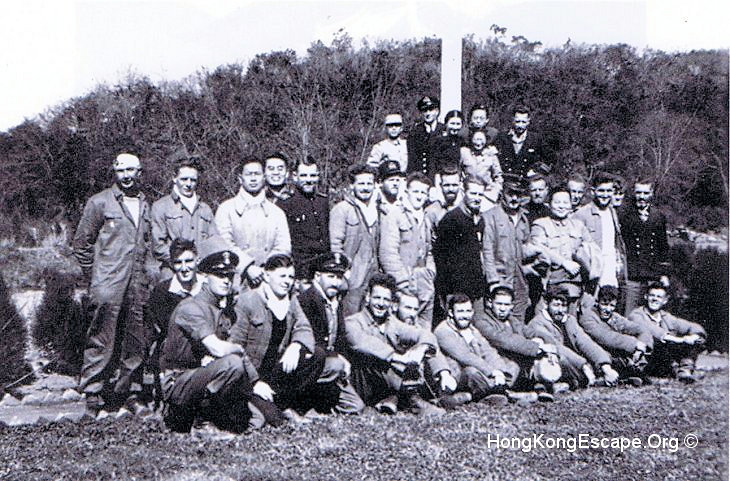 fellow Scot, Andy Braid, who it turned out had his pipes with him. As it was Burns night they took turns on the pipes.
fellow Scot, Andy Braid, who it turned out had his pipes with him. As it was Burns night they took turns on the pipes.
Ships Log "Visit to park (Huaxi) in the morning. Soccer match in afternoon, we lost 6-1. Dinner in the evening given by Governor." [5]
Kennedy spotted a fellow Scot, Andy Braid, who it turned out had his pipes with him and it was Burns night!!.
Lt Kennedy RNVR "I met a Scotsman in the wilds at the back of beyond. He used to go out into a rice field and play his bagpipes, to the great amazement of the local children and hordes of mongrel dogs which joined in the chorus.
The hut we were in was a small one and very soon indignant protests from the other members of the party forced us outside. It was getting dark as we played in turn along the edge of a paddy-field, some of the old marches from school-days, Barren Rocks, Pibroch of Donald Dhu, and the poignant notes of Loch Duich.
We were totally absorbed and only when we stopped realised that a large crowd of children were watching us with aw from a safe distance with all the dogs in the neighbourhood howling in the background." [9]
In the evening they were all invited to a farewell dinner laid on by the Governor, who unfortunately was unable to attend. A very enjoyable evening was had by all with much local rice wine being consumed with much singing and many shouts of "Kan-Pi."
Lt Kennedy RNVR "The dinner started quietly while we got to know the Chinese, but things quickly warmed up after we had been served rice-spirit in little porcelain cups. They had a pernicious habit of shouting "Kan-Pi", with great reujarity and we had to drain our cups and hold them upsidedown over the table to show that they were empty. The art of the game we realised too late was to call "Kan-Pi" when ones own cup was almost empty and the others full." [9]
L/S Les Barker "Wine flowed freely and we enjoyed a hearty meal of the best food available." [24]
Lt Kennedy RNVR "By chance it happened to be 'Burns Night' and before Dr Lim moved on to the next table I quoted a few lines which I could remember from 'The Ode to Haggis'. This he capped at once by reciting the next two verses much to everyones astonnishment.
Many decided to leave the party before the national anthems were sung, but one resolute member, formerly the Coxswain of MTB 10 (CPO Thums) who had stayed too long was seen to stiffen like a ramrod during 'The King,' although he was lying flat on his face on the floor." [9]
David MacDougall MoI "In Chungking there was a great deal that I was duty bound to do – address meetings, give interviews to the press, and write articles. One of the latter is I think being syndicated in U.S.A. by the N.A.N.A. I could have cashed in to the tune of $2000 or more if I’d accepted some of the American offers for my story.
Cables kept coming in. I refused them all out of hand; somehow I couldn’t think of cashing in on the situation with all my friends shut up in that terrible predicament." [26]
David MacDougall MoI was resting and having more X-rays in Chungking before being flown to Chengdu in Sichuan Province, where the university run hospital was considered the best in all China.
David MacDougall MoI "Unluckily the plane was delayed 3 days and I had an extra dose of everything." [26]
26th January 1942 (Mon)
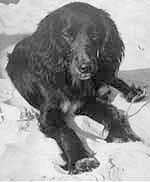 Bruce, the ships dog, accompanied the escape party through the Japanese lines to Waichow and beyond for one thousand three hundred and eighty miles (2,221 Km). Michael Sullivan who went on to be a leading Chinese art historian was driving for the Friends Ambulance Unit stationed at the Red Cross Centre near Guiyang took over Brucey's welfare. Later in 1942 Michael settled in Chengdu working at the museum of the West China Union University. [30]
Bruce, the ships dog, accompanied the escape party through the Japanese lines to Waichow and beyond for one thousand three hundred and eighty miles (2,221 Km). Michael Sullivan who went on to be a leading Chinese art historian was driving for the Friends Ambulance Unit stationed at the Red Cross Centre near Guiyang took over Brucey's welfare. Later in 1942 Michael settled in Chengdu working at the museum of the West China Union University. [30]
Luckily for most it was a late start for Kunming, leaving at noon, with Kelly & Deakin in hospital recovering from the lorry crash. It had been a very enjoyable few days with a distinctly scottish flavour topped off with a considerable amount of local alcohol.
Lt Kennedy RNVR "It was a somewhat jaded party which clamboured into the Red Cross trucks after repeated thanks and farewells to Dr Lim and the many others who had been equally hospitable." [9]
Ships Log "Left for Kunming about noon. Reached Anhsun late afternoon." [5]
Eddie Brazel HKRNVR "We left Kweiyang on the 26th for Kunming, via Anshan, Annan, Penghu, Kut Sing, and arrived in Kunming on the 29th." [46]
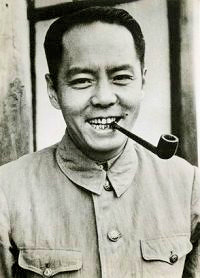 L/S Les Barker "We had a big farewell breakfast, then off again at 11am.
L/S Les Barker "We had a big farewell breakfast, then off again at 11am.
Carried on until 4.30 pm and stayed at a hotel for the night." [24]
The convoy under the command of Doctor Wong was going out empty to collect medical supplies, and so was available for the escape party on its outbound journey. With Lt Ashby now fit enough to travel they made their way down the hill towards the city of Guiyang, picking up the main Chungking to Kunming highway, The Burma Road. The road across the plateau was extremely bumpy passing through many gated & fortified villages, with the ever present choking dust in the open ended trucks.The drivers were much better than the party had experienced in the past, stopping hourly for refreshments, which also aided in keeping the convoy together.
David MacDougall endured a two and a half hour operation at the West China Union University Hospital in Chengdu which failed to extract the bullet lodged under his shoulder blade.
David MacDougall MoI "I am up here for a few weeks for rest and patching up. As soon as I arrived here I got a decent X-ray on me and they found the bullet under the left shoulder blade, jinking about among my ribs. It had smashed through the shoulder blade and was fairly deeply embedded.
They are absolutely first class people – very highly paid Canadians. They operated but failed after two and a half hours to get the bullet. But there was no infection and no puss and in the end they decided to leave it in, and sewed me up again. They say it won’t do any harm." [26]
27 th January 1942 (Tue)
An early start was anticipated by the escape party in Anshun but the Chinese saw to it that did not happen.
L/S Les Barker "Off we were again and travelled over this long ribbon of road which sometimes can be seen for miles ahead, and sometimes on one side is a sheer drop of thousands of feet." [24]
The dust was as bad as the day before, but with the sheer drops it was preferred to rain which would have made the journey suicidal.
Lt Kennedy RNVR "After a late start we passed the Kwang - Ku - Shu, or Orange Tree water - fall, the largest in South China. Despite the choking dust we became increasingly glad that we were travelling in the cold, drier weather of winter." [9]
Later in the day the road descended into a gorge and crossed the river on temporary pontoons after the steel bridge had been bombed just two weeks previously.
Then it was uphill, this time higher than before, at one over-night stop Gandy set a watch as bandits and brigands frequented the route.
Sub-Lt Legge HKRNVR "The dust, combined with the only cigarettes we could obtain, was giving us a hacking cough." [18]
28th January 1942 (Wed)
Maj Goring BHQ "A chill dawn found me at the Eurasia Airways office in Kweilin, waiting for an air-raid to finish before being flown to Chungking. Three hours later we landed safely in the river-bed, between the two towering heights which represented Chungking." [17]
After debriefing Major Goring flew to Calcutta's Dum Dum Airport where he was hospitalised again before making his way to Delhi where he was promoted to Acting Lieutenant-Colonel and resumed his intelligence duties in the British Indian Army HQ.
29th January 1942 (Thur)
The party arrived at the massive ornate gates of the walled city of Kunming the capital of Yunnan province 6,500 feet above sea level in the Wuliang Mountains and contacted the British Council who arranged quarters 5Km up Burma Road.
PO Buddy Hide "We arrived at Kunming, where we were put up by the Chinese travel hostel." [21]
A/B Lenny Rann "Stayed at a hostel that had been prepared and where English food awaited." [63]
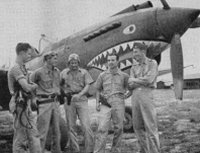 Here they met the 1st contingent of Australian/British Marines of the 204 Military Mission who had travelled up the Burma Road from The Bush Warfare School at Maymyo run by Brigadier (Mad Mike) Calvert. They were on their way to Kiyang to join the 5th Battalion commanded by Lieutenant-Colonel Chen Ling Sun. Under the top secret code name of Tulip Force they were to train the Chinese in commando/guerilla tactics against the Japanese.[5][46] The party swapped their Chinese supplied padded padded jackets they had worn all through the mountains with the commandos for khaki shirts and shorts.
Here they met the 1st contingent of Australian/British Marines of the 204 Military Mission who had travelled up the Burma Road from The Bush Warfare School at Maymyo run by Brigadier (Mad Mike) Calvert. They were on their way to Kiyang to join the 5th Battalion commanded by Lieutenant-Colonel Chen Ling Sun. Under the top secret code name of Tulip Force they were to train the Chinese in commando/guerilla tactics against the Japanese.[5][46] The party swapped their Chinese supplied padded padded jackets they had worn all through the mountains with the commandos for khaki shirts and shorts.
They also saw the first friendly fighter aircraft, the Flying Tigers flown by the American Volunteer Group flying under the Chinese flag. The AVG had many tails of dog fights above the Burma Road they were protecting. The Mercenary pilots were on a salary of $600.00 US per month and a $500.00 bounty per confirmed kill. [14]
Ships Log "PM. Arrived Kunming. Contacted British Consul. Given quarters in rest house 5k out on Burma Rd. Found 1st contingent of British Military Mission in same quarters. (British guerillas or Commandos)" [5]
An enjoyable 28th birthday was celebrated by Buddy Hide, especially as western food was available at the hostel.[66]
Jardine Matheson & Company the international traders and shipping agent had an office here, some seven hundred miles inland from Hong Kong. The agent, Mr Urquhart, was more than keen to to employ Eddie Brazel and other interested former employees. They were needed to staff new inland regional offices being set up due to the loss of China's southern ports.
The demand for silk was at an all-time high, not for the luxury hosiery market, but for parachutes.[75]
Eddie Brazel HKRNVR "Here at last Jardine's had a small office and their agent was more than glad to see the lot of us, myself and three other members of Jardine's staff were immediately taken-over by the office and I am now second in command of a new office, which has been appointed by London as head office in Free China." [46]
The British Embassy in Chungking ordered Lt Pittendrigh, Sub-Lt's Gee & Legge to fly to Chungking to work on cipher material. Five and a half weeks later Lt Pittendrigh was seconded into the British Indian Army with the rank of 1st Lieutenant. By the war's end Pittendrigh had risen to the rank of Major. Kunming was very cosmopolitan with a lot of French influence in some of the architecture.
Ahead lay the most famous road in the world, China's lifeline, the 684 miles [1100 kilometer] long Burma Road, connecting Kunming, high on the Tibet plateau with Lashio in Burma where the railhead is located.
30th January 1942 (Fri)
Ships Log "At Kunming----1st contingent of guerillas left for Hunyang." [5]
These were Australian/British Marines of the 204 military Mission who moved out heading for Kiyang.
31st January 1942 (Sat)
Ships Log "At Kunming. 2nd Contingent of guerillas arrived." [5]

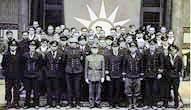
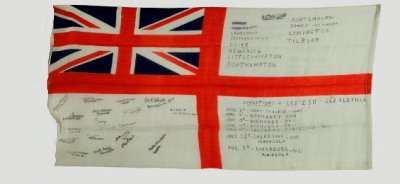
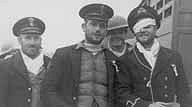

 L/S Les Barker "Still travelling, stopped at 1pm for air raid alarm and scattered in the cliffs which afforded natural cover against air attacks. After about half an hour we proceeded again. Stopped at 11pm at Kwii-Lin east and party went to visit some caves. One in particular was a huge cave called ‘The seven Star Cave’ which was only discovered 5 years ago and said to house 300,000 and was being used as an air raid shelter. Carried on again at 8, travelled through the night."
L/S Les Barker "Still travelling, stopped at 1pm for air raid alarm and scattered in the cliffs which afforded natural cover against air attacks. After about half an hour we proceeded again. Stopped at 11pm at Kwii-Lin east and party went to visit some caves. One in particular was a huge cave called ‘The seven Star Cave’ which was only discovered 5 years ago and said to house 300,000 and was being used as an air raid shelter. Carried on again at 8, travelled through the night." 



 fellow Scot, Andy Braid, who it turned out had his pipes with him. As it was Burns night they took turns on the pipes.
fellow Scot, Andy Braid, who it turned out had his pipes with him. As it was Burns night they took turns on the pipes.  Bruce, the ships dog, accompanied the escape party through the Japanese lines to Waichow and beyond for one thousand three hundred and eighty miles (2,221 Km).
Bruce, the ships dog, accompanied the escape party through the Japanese lines to Waichow and beyond for one thousand three hundred and eighty miles (2,221 Km).  L/S Les Barker "We had a big farewell breakfast, then off again at 11am.
L/S Les Barker "We had a big farewell breakfast, then off again at 11am.

